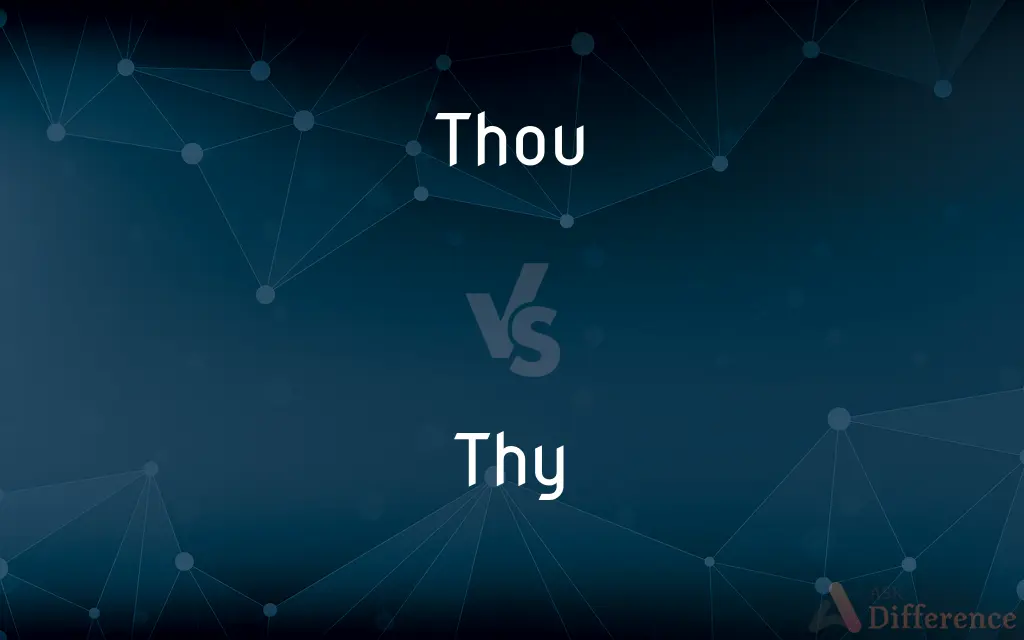Thou vs. Thy — What's the Difference?
By Tayyaba Rehman & Maham Liaqat — Updated on March 26, 2024
"Thou" is a subjective pronoun used for "you" in singular, while "thy" is a possessive form of "thou," equivalent to "your."

Difference Between Thou and Thy
Table of Contents
ADVERTISEMENT
Key Differences
"Thou" is an archaic or poetic form of the second-person singular pronoun "you." It was commonly used in English literature and religious texts to address a single person directly. "Thou" has largely fallen out of use in modern English, replaced by the more formal "you," which now serves for both singular and plural forms. On the other hand, "thy" is the possessive form of "thou," used to indicate ownership or association, similar to how "your" is used in contemporary English. For example, "thy book" means "your book" in today's language.
While "thou" and "thy" are both second-person singular pronouns, their usage differs in that "thou" refers to the person being addressed and "thy" refers to something that belongs to the person being addressed. This distinction is crucial in understanding texts from the Early Modern English period, where these forms were prevalent.
The use of "thou" and "thy" was also influenced by the level of formality and the social status of the person being addressed. In many contexts, "thou" was used in a familiar or informal setting, whereas "you" was reserved for more formal occasions or to show respect. This nuance adds a layer of complexity to the interpretation of historical texts and poetry.
"Thou" and "thy" are often seen in religious texts, such as the King James Bible, where they serve to personalize the relationship between the believer and the divine. Their use in such texts can indicate intimacy and a personal connection, underscoring the personal nature of spiritual devotion.
In modern usage, "thou" and "thy" are primarily found in literature, poetry, and religious or historical texts to evoke an archaic or solemn tone. Their presence in contemporary language is mostly limited to artistic or rhetorical purposes, reflecting a deliberate choice to convey tradition, solemnity, or poetic depth.
ADVERTISEMENT
Comparison Chart
Pronoun Type
Subjective
Possessive
Equivalent
You (singular)
Your
Usage
To address a single person
To indicate possession or relation to the person addressed
Context
Archaic, poetic
Archaic, poetic
Example
"Thou art kind."
"Thy kindness is appreciated."
Modern Relevance
Mostly in literature and religious texts
Mostly in literature and religious texts
Compare with Definitions
Thou
Appears in classical literature and religious texts to denote intimacy.
Thou shalt not steal.
Thy
Employed in modern times for stylistic or rhetorical effects.
Thy presence is requested.
Thou
Reflects an archaic style of English language.
Knowest thou the land?
Thy
Possessive form of "thou," indicating ownership.
Thy book is on the table.
Thou
Used historically to address a single individual in a familiar context.
Thou art my friend.
Thy
Represents an archaic or poetic expression of possession.
Thy voice is music to mine ears.
Thou
Invokes a solemn or ceremonial tone in modern usage.
Thou art invited to the ceremony.
Thy
Used to express a close or personal relationship in historical contexts.
Thy words mean much to me.
Thou
Subjective second-person singular pronoun used in a formal or poetic manner.
Thou hast made me glad.
Thy
Common in religious texts to signify personal devotion.
Thy will be done.
Thou
The word thou is a second-person singular pronoun in English. It is now largely archaic, having been replaced in most contexts by you.
Thy
Archaic or dialect form of your
Honour thy father and thy mother
Thou
Compare with thee
Thou art fair, O my beloved
Thy
Used as a modifier before a noun.
Thou
A thousand
Two hundred thou
Thy
Form of Possessive form.
Thou
A thousand, especially of dollars.
Thy
Of thee, or belonging to thee; the more common form of thine, possessive case of thou; - used always attributively, and chiefly in the solemn or grave style, and in poetry. Thine is used in the predicate; as, the knife is thine. See Thine.
Our father which art in heaven, Hallowed be thy name. Thy kingdom come. Thy will be done.
These are thy glorious works, Parent of good.
Thou
Form of {{glossary.
Thou
(transitive) To address (a person) using the pronoun thou, especially as an expression of contempt or familiarity.
Don’t thou them as thous thee!
– a Yorkshire English admonition to overly familiar children
Thou
(intransitive) To use the word thou.
Thou
(Britain) A unit of length equal to one-thousandth of an inch (25.4 µm).
Thou
(slang) A thousand, especially a thousand of some currency (dollars, pounds sterling, etc.).
Thou
Misspelling of though
Thou
Misspelling of though
Thou
The second personal pronoun, in the singular number, denoting the person addressed; thyself; the pronoun which is used in addressing persons in the solemn or poetical style.
Art thou he that should come?
Thou
To address as thou, esp. to do so in order to treat with insolent familiarity or contempt.
If thou thouest him some thrice, it shall not be amiss.
Thou
To use the words thou and thee in discourse after the manner of the Friends.
Thou
The cardinal number that is the product of 10 and 100
Common Curiosities
How do "thou" and "thy" reflect social status in historical contexts?
Historically, "thou" could indicate a closer, more familiar relationship or lower social status, whereas "you" was used for formal situations or to address someone of higher status.
What is the difference between "thou" and "thy"?
"Thou" is a subjective pronoun for "you" (singular), while "thy" is the possessive form, equivalent to "your."
Why do some religious texts still use "thou" and "thy"?
To maintain the traditional language in which they were originally written and to evoke a sense of solemnity.
Why were "thou" and "thy" replaced by "you"?
Over time, English evolved to use "you" for both singular and plural forms, for simplicity and to address people formally.
Are "thou" and "thy" still used today?
They are mostly used in literature, poetry, and religious or historical texts for stylistic purposes.
Is there a plural form of "thou" and "thy"?
Yes, the plural forms are "ye" for the subjective case (replacing "thou") and "your" for the possessive case (replacing "thy").
Can "thou" and "thy" be used interchangeably?
No, they serve different grammatical purposes: "thou" as a subject and "thy" to indicate possession.
How does the use of "thou" and "thy" affect the interpretation of historical texts?
Understanding the use of "thou" and "thy" helps modern readers grasp the nuances of intimacy, formality, and social hierarchy in historical texts.
Can "thou" and "thy" be found in contemporary creative works?
Yes, contemporary poets, authors, and songwriters sometimes use "thou" and "thy" to lend their works an archaic or solemn flavor.
What are some challenges with translating "thou" and "thy" in modern languages?
Translating these pronouns can be challenging because many languages no longer have distinct forms for formal and informal second-person singular pronouns, making it difficult to capture the original nuance.
Share Your Discovery

Previous Comparison
Subparagraph vs. Paragraph
Next Comparison
Appearance vs. SemblanceAuthor Spotlight
Written by
Tayyaba RehmanTayyaba Rehman is a distinguished writer, currently serving as a primary contributor to askdifference.com. As a researcher in semantics and etymology, Tayyaba's passion for the complexity of languages and their distinctions has found a perfect home on the platform. Tayyaba delves into the intricacies of language, distinguishing between commonly confused words and phrases, thereby providing clarity for readers worldwide.
Co-written by
Maham Liaqat












































